-
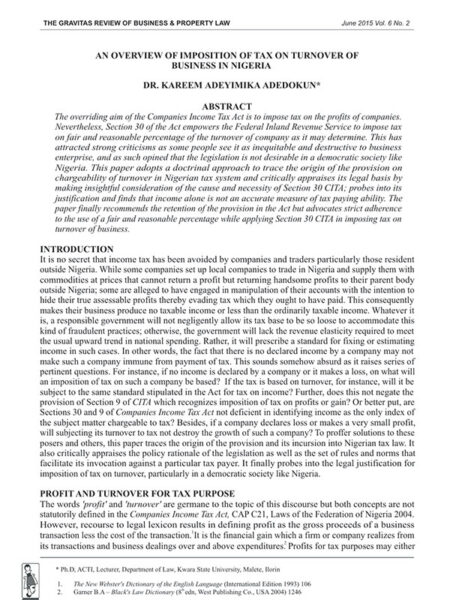
An Overview of Imposition of Tax on Turnover of Business in Nigeria
0₦2,500.00In “An Overview of Imposition of Tax on Turnover of Business in Nigeria” Dr. Kareem Adedokun of the Kwara State University argues that subjecting the Turnover of Business, rather than its profit, to tax is a necessary anti-avoidance rule and compatible with the status of Nigeria as a democratic country.
-
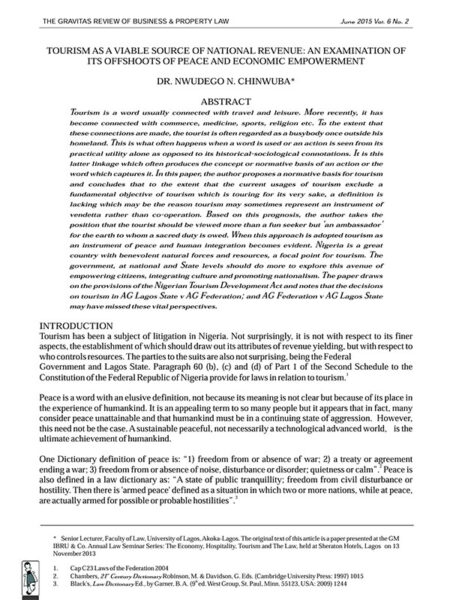
Tourism as a Viable Source of National Revenue: An Examination of its Offshoots of Peace and Economic Empowerment
0₦2,500.00Dr. Nwudego Chinwuba of the University of Lagos discusses how Tourism can be an instrument for peace and development and advocate an amendment of the Constitution and the NTDC Act for advancement of tourism in Nigeria in her article “Tourism as a Viable Source of National Revenue: An Examination of its Offshoots of Peace and Economic Empowerment”.
-
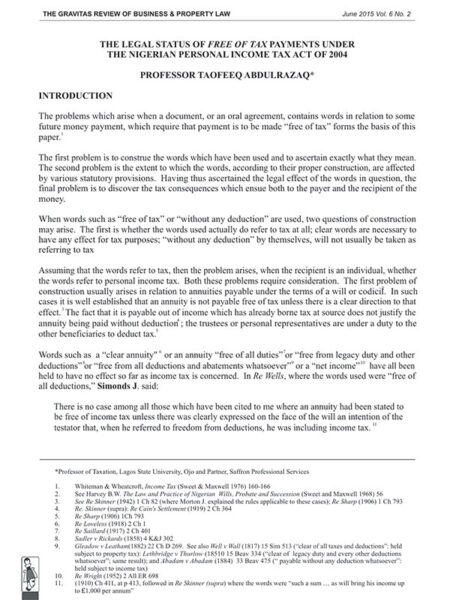
The Legal Status of Free of Tax Payments under the Nigerian Personal Income Tax Act of 2004
0₦2,500.00Dr. Taofeeq Abdulrazaq, FIRS Professor of Taxation, Lagos State University and Partner Saffron Professional Services, examines the legal status of the expressions “free of tax”, “free of all deductions” etc in “The Legal Status of Free of Tax Payments under the Nigerian Personal Income Tax Act of 2004”.
-
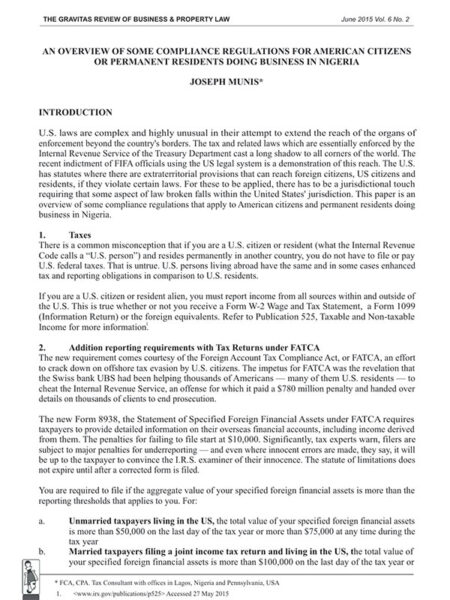
An Overview of Some Compliance Regulations for American Citizens or Permanent Residents doing Business in Nigeria
0₦2,500.00Joseph Munis, gives an overview of some compliance regulations that apply to American citizens and permanent residents doing business in Nigeria in An Overview of some Compliance Regulations for American Citizens or Permanent Citizens doing Business in Nigeria. U.S. laws are complex and highly unusual in their attempt to extend the reach of the organs of enforcement beyond the country’s borders. The tax and related laws which are essentially enforced by the Internal Revenue Service of the Treasury Department cast a long shadow to all corners of the world. The recent indictment of FIFA officials using the US legal system is a demonstration of this reach. The U.S. has statutes where there are extraterritorial provisions that can reach foreign citizens, US citizens and residents, if they violate certain laws. For these to be applied, there has to be a jurisdictional touch requiring that some aspect of law broken falls within the United States’ jurisdiction.
-
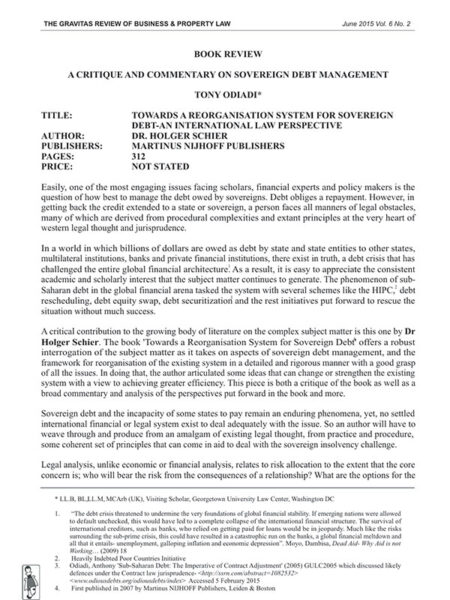
Towards a Reorganisation System for Sovereign Debt – An International Law Perspective
0₦2,500.00Tony Odiadi, Visiting Scholar, Georgetown University Law Center, Washington DC, reviews the book “Towards a Reorganisation System for Sovereign Debt – An International Law Perspective” written by Holger Schier. Easily, one of the most engaging issues facing scholars, financial experts and policy makers is the question of how best to manage the debt owed by sovereigns. Debt obliges a repayment. However, in getting back the credit extended to a state or sovereign, a person faces all manners of legal obstacles, many of which are derived from procedural complexities and extant principles at the very heart of western legal thought and jurisprudence.
-
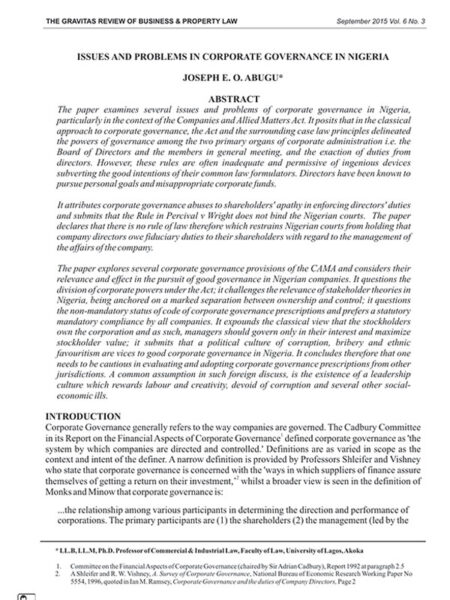
Issues and Problems in Corporate Governance in Nigeria
0₦2,500.00Joseph Abugu, Professor of Commercial and Industrial Law, University of Lagos, Akoka, in his article “Issues and Problems in Corporate Governance in Nigeria” examines the problem of Corporate Governance in Nigeria and argue that in an environment of corruption, bribery and ethnic favouritism, adopting corporate governance codes informed by experiential evolution of other cultures could be counterproductive.
-
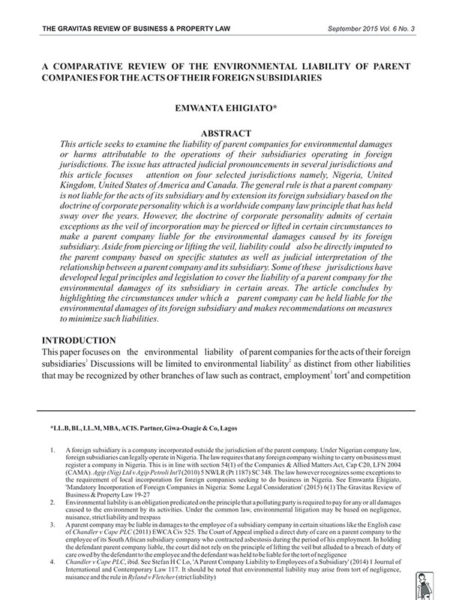
A Comparative Review of the Environmental Liability of Parent Companies for the Acts of their Foreign Subsidiaries
0₦2,500.00Emwanta Ehigiato, Partner, Giwa-Osagie & Co in “A Comparative Review of the Environmental Liability of Parent Companies for the Acts of their Foreign Subsidiaries” examines the liability of parent companies for the acts of their foreign subsidiaries especially in cases of environmental infractions. He gives a robust overview of corporate liability in several jurisdictions while analysing the state of the law in Nigeria.
-
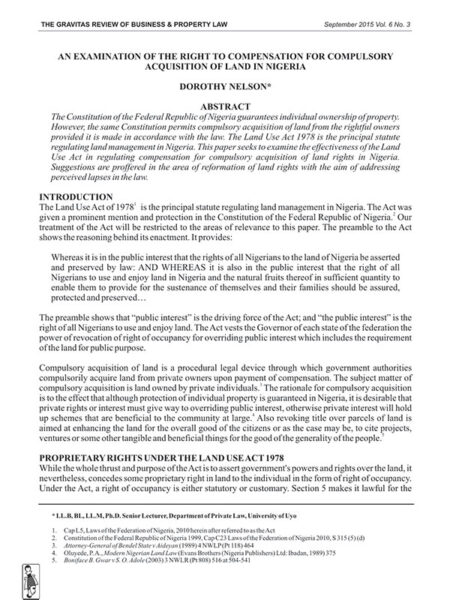
An Examination of the Right to Compensation for Compulsory Acquisition of Land in Nigeria
0₦2,500.00Dr. Dorothy Nelson, Senior Lecturer, Department of Private Law, University of Uyo, in her article “An Examination of the Right to Compensation for Compulsory Acquisition of Land in Nigeria” discusses the right to compensation under the Land Use Act and argue that while compulsory acquisition may be necessary for societal growth, acquisition, via revocation of interest, must scrupulously comply with the template laid by the Supreme Court in the case of Osho v Foreign Finance Corp.
-
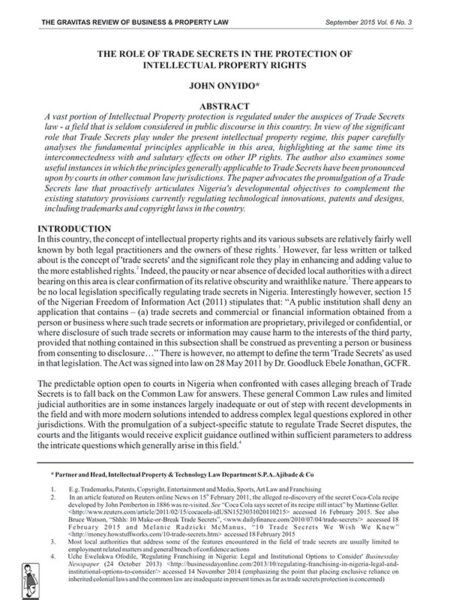
The Role of Trade Secrets in the Protection of Intellectual Property Rights
0₦2,500.00John Onyido, Partner, SPA Ajibade & Co, in his article “The Role of Trade Secrets in the Protection of Intellectual Property Rights” explores the seldom walked path of Trade Secrets in the protection of intellectual property. He bemoans the absence of a Trade Secrets law in Nigeria despite the fact that, in the word of Karl Jorda, “…trade secrets cover over 90% of all new technology; and over 80% of all license and technology transfer agreements cover trade secrets or constitute hybrid agreements relating to patents and trade secrets”.
-
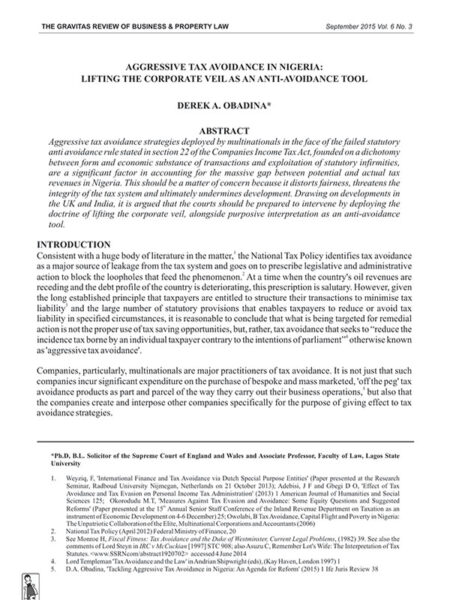
Aggressive Tax Avoidance in Nigeria: Lifting the Corporate Veil as an Anti-Avoidance Tool
0₦2,500.00Derek Obadina, Associate Professor of Taxation, Lagos State University, in his article “Aggressive Tax Avoidance in Nigeria: Lifting the Corporate Veil as an Anti-Avoidance Tool” examines tax avoidance and the deployment of corporate veil lifting as an anti-avoidance tool.
-
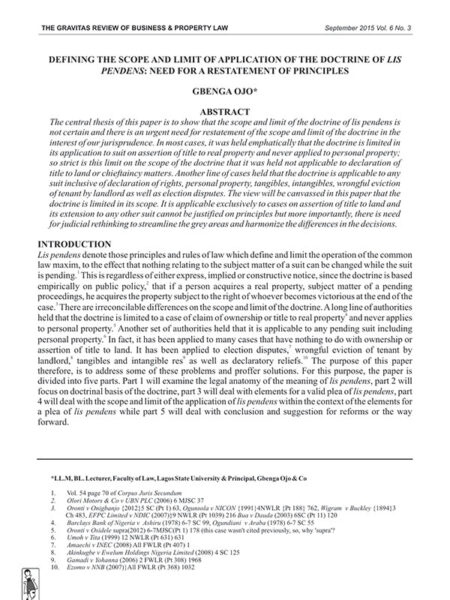
Defining the Scope and Limit of Application of the Doctrine of Lis Pendens: Need for a Restatement of Principles
0₦2,500.00Gbenga Ojo, Lecturer, Lagos State University & Principal, Gbenga Ojo & Co in “Defining the Scope and Limit of Application of the Doctrine of Lis Pendens: Need for a Restatement of Principles” dissects several decided cases on the doctrine of lis pendens and argue that some of them including a Supreme Court case may have been decided per incuriam.
-
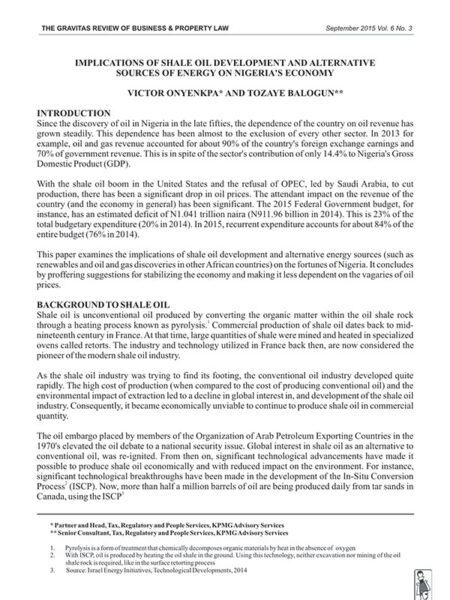
Implications of Shale Oil Development and Alternative Sources of Energy on Nigeria’s Economy
0₦2,500.00It is not just another scare: Victor Onyenkpa and Tozaye Balogun, Partner and Senior Consultant respectively, KPMG Advisory Services, with facts and figures, examine the dire consequences of the development of Shale Oil on Nigeria’s economy. Their article, “Implications of Shale Oil Development and Alternative Sources of Energy on Nigeria’s Economy” however proffers a way out.
The Gravitas Review of Business & Property Law



